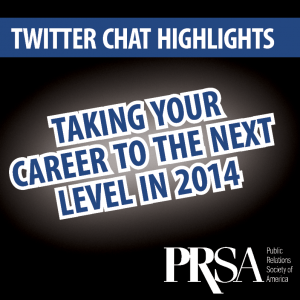Y ou studied hard, joined PRSSA, did multiple internships, networked, graduated, networked some more and got a job. Phew! Now, you no longer have to worry about your LinkedIn activity, participate in that Twitter chat or attend local industry events, right? Wrong!
ou studied hard, joined PRSSA, did multiple internships, networked, graduated, networked some more and got a job. Phew! Now, you no longer have to worry about your LinkedIn activity, participate in that Twitter chat or attend local industry events, right? Wrong!
In case you haven’t already figured it out, the PR industry is like a big small-town. There aren’t six degrees of separation, in many cases there are barely three. It seems everyone knows everyone (or knows someone who knows someone). This tight-knittedness is capable of swinging the pendulum in your favor–or not. The choice, really, is yours.
How do you hold on to that network you’ve worked so hard to build? How do you continue to build that network, and make it work for you?
- My first suggestion is to not just attend your PRSA chapter meetings, but volunteer and get involved. As current president of the PRSA-St. Louis Chapter, I can tell you that having new pros on our committees are just as important as having senior pros. You provide a different perspective, and we need all viewpoints represented. In addition, You will work side-by-side with seasoned pros, who will get to know your solid work ethic first-hand and meet people you may have not have had access to otherwise. Volunteering is work, and creates work experience.
- Participate in Twitter chats. Not just #NPPRSA, but other industry-related chats, such as #PRprochat started by Carrie Morgan, or the #SoloPR chat spearheaded by Kellye Crane. Not only may you meet your next recruit, but many senior pros participate in those chats as well. Doing this keeps you in front of your network, expands your network, and may even provide informational content you can later expand into a blog post!
- Join applicable LinkedIn groups and participate in the discussions. Don’t feel like you can’t contribute if you don’t know the answers–ask questions, there may be others with the same question.
- I’m sure you have certain industry-leading blogs to which you subscribe. Don’t just read those posts, comment and reply to other comments. Add value to the community. Warning: be careful to not over-do it; you don’t want to comes across as a stalker.
- Finally, swinging back to #1 – involvement in your local PR organization. You should at least set a goal of attending one event per quarter (4 per year). And, don’t just attend make a point of introducing yourself to at least three new people at each event. Then, within a couple days of the event, connect with them on LinkedIn—reminding them where you met and thanking them for the conversation, then follow-up. The follow-up doesn’t have to be often but does need to be pertinent and professional.
A case in point: a while back I wrote a post on mentoring for BurrellesLuce Fresh Ideas blog. In it, I mentioned that Lori George Billingsley, director of issues communications at The Coca-Cola Company and past PRSA Multicultural Communications Section chair, claims her mentor has been instrumental in helping her secure all of the PR jobs she’s held. That’s a pretty powerful testament to her networking, diligence and professionalism!
There’s no doubt that social media makes it much easier to keep in touch with people. However, no matter how much you keep in touch electronically, nothing beats face-to-face conversations to build your network!
Share what you’re doing to build and strengthen your network in the comments below.
 Tressa Robbins is Implementation Vice President at BurrellesLuce, to ensure successful onboarding of major accounts with traditional and social media monitoring, media contacts and press release distribution, as well as reporting and analytics. She is the president of the PRSA St. Louis chapter, a PRSSA mentor, professional advisor to the Southeast Missouri State PRSSA chapter, and serves on Southeast’s Mass Media Department Professional Advisory Council as well as teaches a special topics course this semester. You may follow and connect with her on Twitter.
Tressa Robbins is Implementation Vice President at BurrellesLuce, to ensure successful onboarding of major accounts with traditional and social media monitoring, media contacts and press release distribution, as well as reporting and analytics. She is the president of the PRSA St. Louis chapter, a PRSSA mentor, professional advisor to the Southeast Missouri State PRSSA chapter, and serves on Southeast’s Mass Media Department Professional Advisory Council as well as teaches a special topics course this semester. You may follow and connect with her on Twitter.


 If you can, ask fellow co-workers you trust about their salary when they were interns and offered a full-time position. When you’re given the contract, take it home and read through every detail. Look for all it includes: responsibilities, salary, insurance and other perks such as compensations for a phone, gym membership, professional development, etc. When negotiating, make sure to talk about all the work you’ve completed and if you’re asking for an increase, give a range or a few options and reasons for why you believe you deserve more (for example, between 3-5K more because of X or PRSA membership compensated because X).
If you can, ask fellow co-workers you trust about their salary when they were interns and offered a full-time position. When you’re given the contract, take it home and read through every detail. Look for all it includes: responsibilities, salary, insurance and other perks such as compensations for a phone, gym membership, professional development, etc. When negotiating, make sure to talk about all the work you’ve completed and if you’re asking for an increase, give a range or a few options and reasons for why you believe you deserve more (for example, between 3-5K more because of X or PRSA membership compensated because X). Nicole Bersani is an assistant account executive Social@Ogilvy and also serves as the PRSA New Professionals Section mentorship co-chair. Connect with her on Twitter
Nicole Bersani is an assistant account executive Social@Ogilvy and also serves as the PRSA New Professionals Section mentorship co-chair. Connect with her on Twitter  Did that headline catch your attention? Good. If there is one thing that I appreciate in friends, colleagues, and experts, is honesty. Don’t sugar coat anything; tell me how hard something is going to be so I’m prepared.
Did that headline catch your attention? Good. If there is one thing that I appreciate in friends, colleagues, and experts, is honesty. Don’t sugar coat anything; tell me how hard something is going to be so I’m prepared.

 1) Read (a book) daily.
1) Read (a book) daily.
